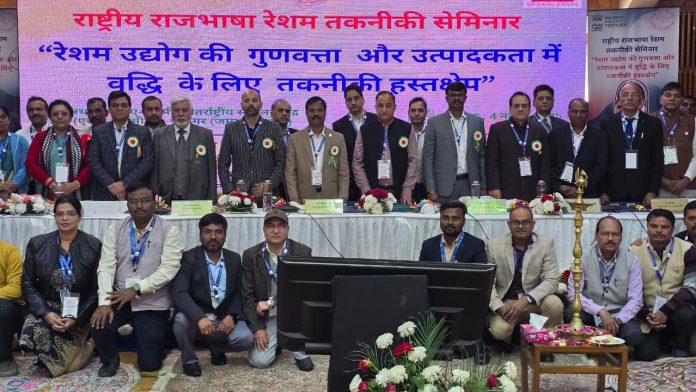SRINAGAR: The Central Sericultural Research & Training Institute (CSRTI), Pampore, under the Central Silk Board, Ministry of Textiles, organized a National Technical Seminar on “Technological Interventions for Improving Quality and Productivity of Silk Industry” at Sher-e-Kashmir International Convention Centre, Srinagar.
The seminar was inaugurated by Chief Executive Officer and Member Secretary, Central Silk Board, and Director General, International Sericulture Commission, P. Sivakumar, who graced the occasion as the Chief Guest.
The event was also attended by several distinguished dignitaries, including Director, Sericulture Development Department, Jammu and Kashmir, Aijaz Ahmad Bhat; Director, CSB–Central Sericultural Research and Training Institute, Pampore, Dr. Sardar Singh; Director (Retd.), Central Silk Board, Dr. M.A. Khan; Director, Handicrafts and Handloom, Kashmir, Mussarat Islam;
Joint Director, Rajbhasha Vibhag, Ministry of Home Affairs, K.P. Sharma, ; and Joint Secretary (Tech), Central Silk Board, Bengaluru, Dr. Naresh Babu.
In his inaugural address, P. Sivakumar assured full support from the Central Silk Board for the promotion and sustainable growth of bivoltine sericulture in Jammu and Kashmir. He appreciated the superior quality of Kashmir silk and emphasized the need for global branding of silk products from the region to enhance their visibility and market potential worldwide.
Director, Sericulture Development in his address said that the deliberation and research findings being shared in bilingual (Hindi and Urdu) will have a far-reaching consequence for Technology diffusion and Silk Production and Productivity improvement across India especially in J&K. He further emphasized that such type of events may be continuously organized for the benefits of Sericulture farmers and revive this age-old legacy of Kashmir and promote Kashmiri silk as a brand.
Director, CSB–Central Sericultural Research and Training Institute, Pampore, informed that it is first time that Institute is organizing a dedicated National Technical Seminar where sericulture scientific deliberations are being made in Hindi.
Director Handloom, appreciated the efforts and hope that it will add new dimensions to sericulture industry of Kashmir and Department of Handloom will be ultimate beneficiary of these developments as silk is an important constituent of Handloom products of Kashmir Valley being exported worldwide.
Joint Director, Rajbhasha Vibhag, informed that Central Silk Board is playing a pivotal role in popularizing the Hindi as a medium of communication in Scientific deliberations. It is a welcome step that Sericulture farmers will get the information in their mother tongue as a result a communication between scientists and farming community is going to be more effective, he added.
On the occasion, three Hindi publications Abstract Book (Smarika), Annual Hindi Magazine, and Half-Yearly Newsletter were released by the Chief Guest and other dignitaries.
A total of 88 scientists from 20 states participated in the seminar and presented their research findings through oral and poster presentations.
During the Rajbhasha Session, four presentations were made by Hindi officers from the Central Silk Board, emphasizing the importance of Hindi in science and technology communication.
In the technical sessions, Directors from nine R&D institutes of the Central Silk Board presented their lead papers on the current status of Mulberry, Tasar, Muga, and Eri sericulture, along with Post-Cocoon technologies and by-products.
Across the Mulberry, Vanya, and Post-Cocoon sessions, 34 oral presentations and 25 posters were presented.
This was the first Hindi technical seminar organized by the Central Silk Board in the Kashmir Valley, providing a platform for meaningful discussion on sericulture technologies, scientific advancements, and strategies for the sustainability of sericulture in North-West India.


